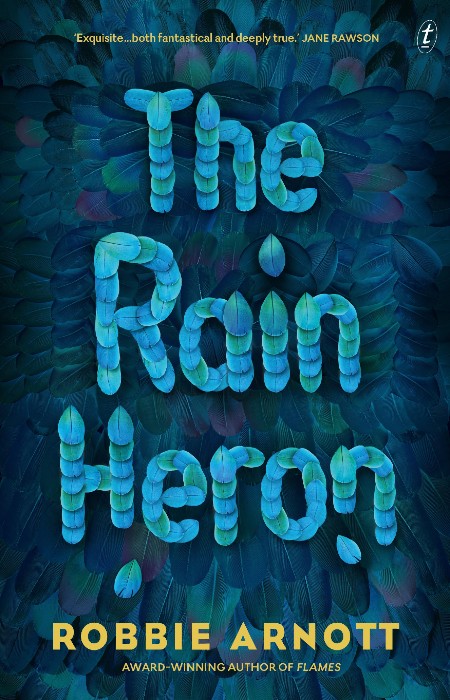
Sociopaths and psychopaths aside, no one ever wakes up one day and thinks to themselves that now is the time I will put aside all my lofty hopes and dreams for the future and choose instead to do those things which slowly but surely corrode my soul and eat away at my very sense of self.
Almost to a person, any slide away from the glittering dreams of childhood and youth takes place in increments, a compromise here, a rationalisation there, many of them driven by circumstances well beyond our control.
What troubles many people, quite apart from the literal or figurative blood on their hands, is whether there is any way back from this decent into darkness, an existential dilemma which forms the narrative core and beating heart of Robbie Arnott’s The Rain Heron, a luminously poetic novel which asks whether redemption is even possible in a world famously short on second chances and forgiveness.
The short answer is “Yes” but the longer answer, on a journey that takes the book’s protagonists up and down mountains and through forests and into the heart of a country plagued by war, coups and decay, is that redemption is a hard won thing and not something you can pluck off the shelf when it suits you.
The hardest part of course is extricating you from the fast-flowing figurative waters of life, a linear stream that yields to no one and which is usually so strong and full of momentum that it is often easier, pricks of conscience aside, to simply keep going with the flow.
“In the five years since she’d come to the mountain, Ren had almost died on many occasions. Early on, starvation nearly killed her. Then she nearly died of malnutrition, and the fevers and sickness that came with it. She nearly froze. In a cool, happy stream she nearly drowned. She was nearly gored by a boar, nearly kicked to death by a cornered buck. She nearly poisoned herself with hemlock tea. She nearly fell from a cliff three times, and narrowly missed being crushed by tumbling rocks on others. All her preparations, her research, all the books she’d read: none of it prepared her for the sheer rush of death that comes with being in the wilderness.
But she did not die, thanks to the shelter she found in the cave, to the foraging and survival skills she cobbled together, to her thick vein of stubbornness. And mostly she didn’t die because of Barlow.” (P. 21)
That is, in part, what a number of the characters do at first.
Soldiers Zoe and Daniel, the former a commander, the other a medic drafted into the military, are two people who have long gone along with the cards they have been dealt.
Through some pithily executed backstory which doesn’t slow down the current recounting of events but enriches them with meaning and emotion, we come to understand why it is that these two people have made deals with the devil, more through inaction and a resignation to the inevitable rather than any cold-blooded decision to do wrong.
We come to understand that each of them are trying to ameliorate the dark deeds they are called to commit in their own small ways – Daniel practices kindness where he can, offering help in small ways that indicate he still has a beating heart while Zoe, who has endured great loss and pain in her recent past, tries not to be cruel as her equivalents in the military though the effect on those she is trying to coerce and control ends up being effectively the same as those officers she reviles for their barbarous transgression of human rights.
Ren, meanwhile, who we first meet in this exquisitely beautiful piece of illuminative writing, has made a stand of sorts, fleeing an urban area of the country for the relative sanctuary of the mountains where she lives a mostly-self-sufficient existence, aided by Barlow, a kindly man from a nearby village (and his son) who supplies the goods she can’t acquire from the forest.

All of these people come together when a military unit commanded by Zoe and of which Daniel is a reluctant member (though he is glad he is with someone reasonably principled like Zoe and not some other amoral leader), comes to the forest Ren calls home to convince her to help them capture the mythical rain Heron, a creature of legend which it is believed could change the drought-ravaged fortunes of the strife-torn country.
The titular bird is a wondrous thing, a creature that merges with the water of which it is composed, only emerging at certain points and instilling awe and wonder when it does.
It is the very epitome of purity and truth and Ren, who saw the rain heron as a little girl and knows it exists, is forced by Zoe to make decisions she regrets in pursuit of the bird, an act (which is coerced in ways that seem benign but are as bloodthirsty as they come) which has far-reaching ramifications for everyone concerned in the endeavour, not least in the way each of them is forced to confront who they were, who they were and who, most critically, they want to be.
The Rain Heron sets in train a chain of events, told in a soulful, meditative manner that always feels grounded in the haunting reality of what it means to be human and which remind that the road to redemption, if such a thing even exists, is never as straightforward or lacking in cost as you might think.
“‘Okay,’ said Daniel. ‘Okay.’
It was clear that he should leave, so he stood up and washed his hands in the river, rinsing them hard and cold up to his elbows. He wondered if in the next day, and the ones that followed, he’d feel different: if putting distance between themselves and the mountain would change anything inside him. Then he went to his tent and crashed to sleep, his boots still on.” (P. 147)
In fact, finding your way out of the mess that our lives can all too easily become, and disentangling yourself from the compromises, loss of integrity and the self-lies we tell ourselves to live with our deeds, is an arduous journey, one studded with heartwarming moments of epiphany but also even more pain and loss at times, causing us to question if it’s even worth it.
There is no doubt as you read this most wondrous of books, that weaves together gritty humanity and fantastical possibility, that you will find yourself alternately buoyed by what might and can be and saddened by the loss of promise that can turn to painful disappointment in a heartbeat.
But one thing that stays with you and resonates long after you have turned the last page of The Rain Heron is how the search for redemption, for those that have never truly relinquished the truth of who they are or have reached the end of compromise and long for the return of the integrity they once knew (and still value), is all but inevitable for a great many people.
That doesn’t mean they are guaranteed a happy ending nor the very best of things miraculously appearing where once was the very worst of who they had unwittingly become, but it does mean that they will be forced, through sheer truth-demanding self-awareness, to face a time of great reckoning and see where it takes them.
There is much darkness and sadness and loss in The Rain Heron which doesn’t make a fairytale (thought it does often read like one) of the long journey into personal ruin and possibly back again, but there is also great humanity and hope and the chance of things getting better, and while there are no guarantees of redemption being found or sticking, the fact that there is a chance at all of coming back from losing who you are is uplifting enough in a world where not even that possibility often seems like it’s in the offing.